The Mainstream Phoenix Rises: Samsung's 970 EVO (500GB & 1TB) SSDs Reviewed
by Billy Tallis on April 24, 2018 10:00 AM ESTMixed Random Performance
Our test of mixed random reads and writes covers mixes varying from pure reads to pure writes at 10% increments. Each mix is tested for up to 1 minute or 32GB of data transferred. The test is conducted with a queue depth of 4, and is limited to a 64GB span of the drive. In between each mix, the drive is given idle time of up to one minute so that the overall duty cycle is 50%.
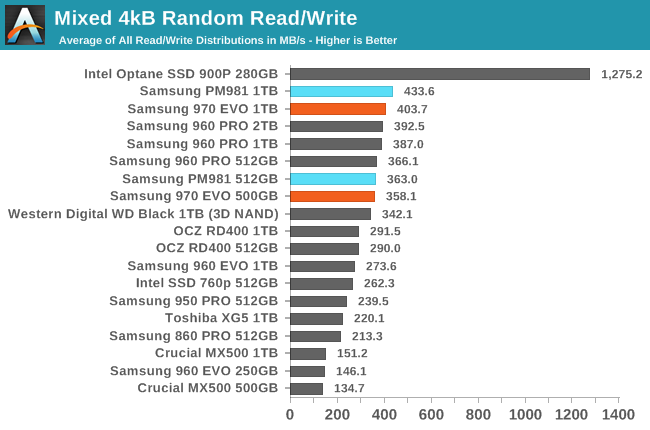
The Samsung 970 EVO is slightly slower than the OEM PM981 on the mixed random I/O test, but that still leaves the 1TB model very near the top of the chart, and the 500GB 970 EVO is only slightly behind the MLC-based 960 PRO.
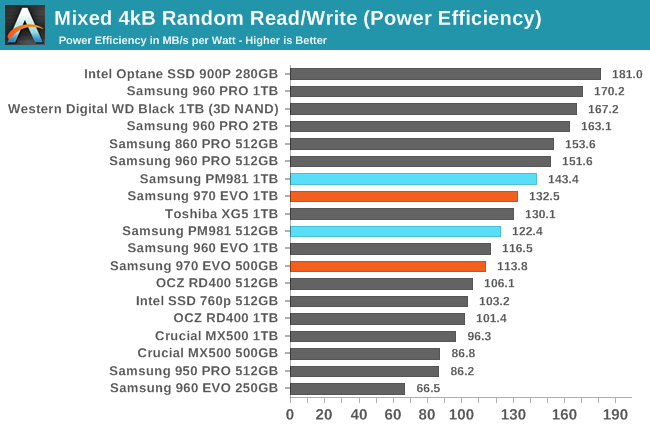 |
|||||||||
| Power Efficiency in MB/s/W | Average Power in W | ||||||||
The power efficiency of the Samsung 970 EVO trails the PM981 by a larger margin than performance alone did. The efficiency of the best MLC drives seems almost out of reach for TLC drives, except that the WD Black is in third place overall with 26% better efficiency than the 970 EVO.
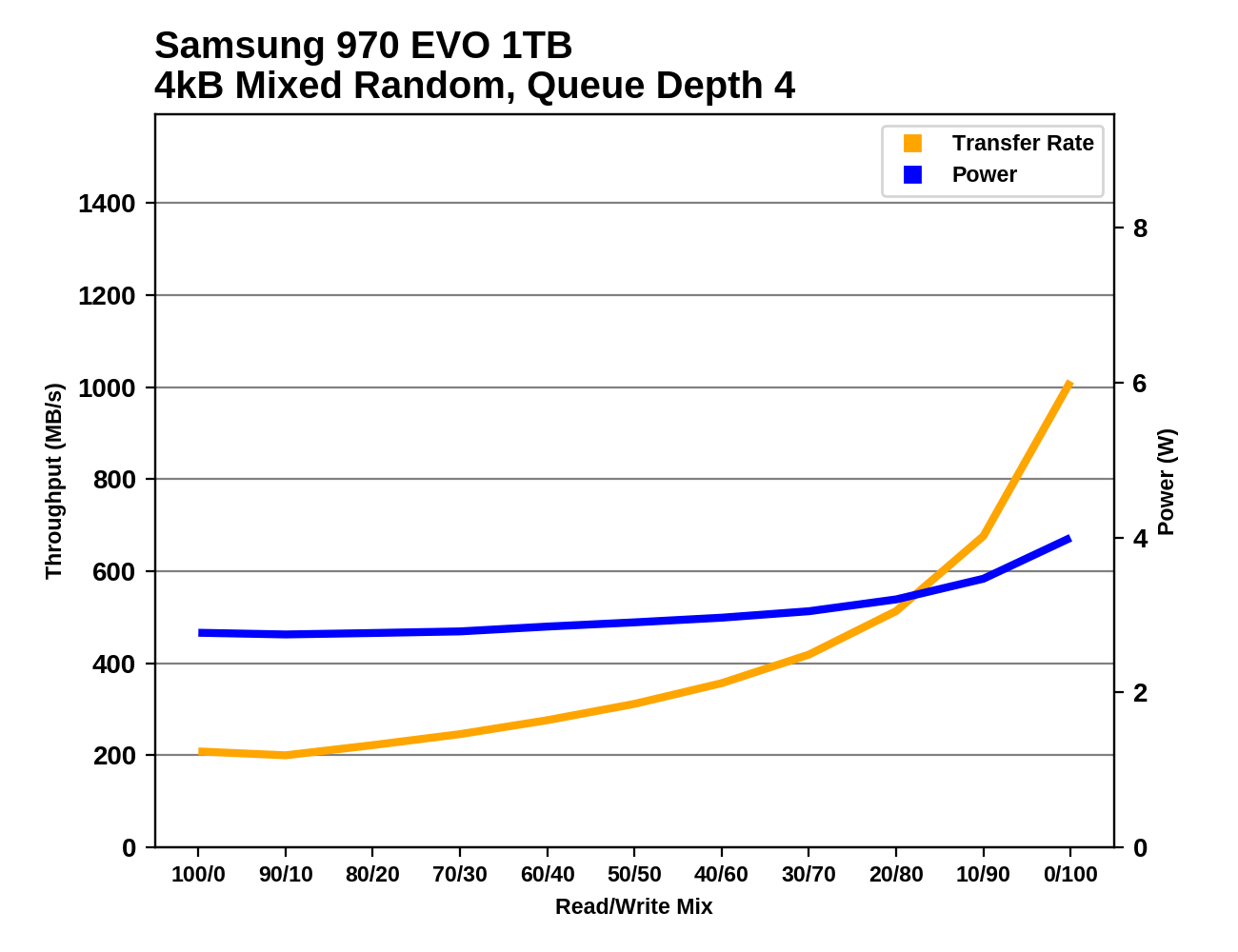 |
|||||||||
The Samsung 970 EVO's performance barely drops when writes are first added to the mix, and it grows at an accelerating rate through the rest of the test. The PM981 pulls ahead in the final phases with higher random write performance than the 970 EVO. The 960 EVO showed very flat performance until fairly late in the test, leaving it well behind the 970 EVO for overall performance despite offering similar performance at either end of the test.
Mixed Sequential Performance
Our test of mixed sequential reads and writes differs from the mixed random I/O test by performing 128kB sequential accesses rather than 4kB accesses at random locations, and the sequential test is conducted at queue depth 1. The range of mixes tested is the same, and the timing and limits on data transfers are also the same as above.
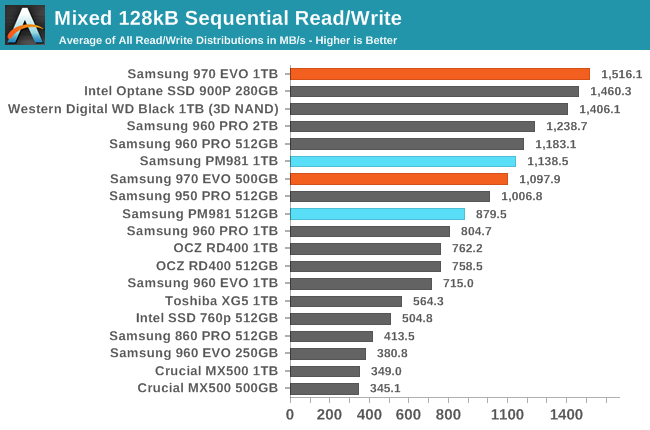
The Samsung 970 EVO sets new records on the mixed sequential I/O test, with the 1TB model beating the Intel Optane SSD and the WD Black. The 500GB model is significantly slower, but still performs well for its capacity. Both models are much faster than the PM981.
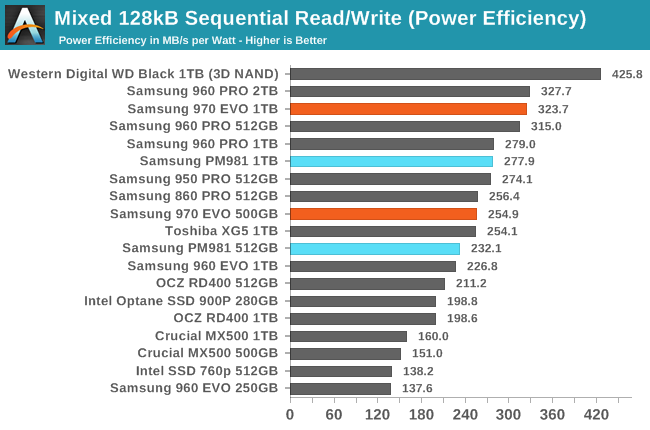 |
|||||||||
| Power Efficiency in MB/s/W | Average Power in W | ||||||||
The 1TB Samsung 970 EVO is essentially tied for second place in power efficiency on the mixed sequential I/O test, but the first place WD Black has a large lead. The improved performance of the 970 EVO over the PM981 is match by improved efficiency, but in absolute terms the 970 EVO is drawing more power than almost any flash-based SSD on this test.
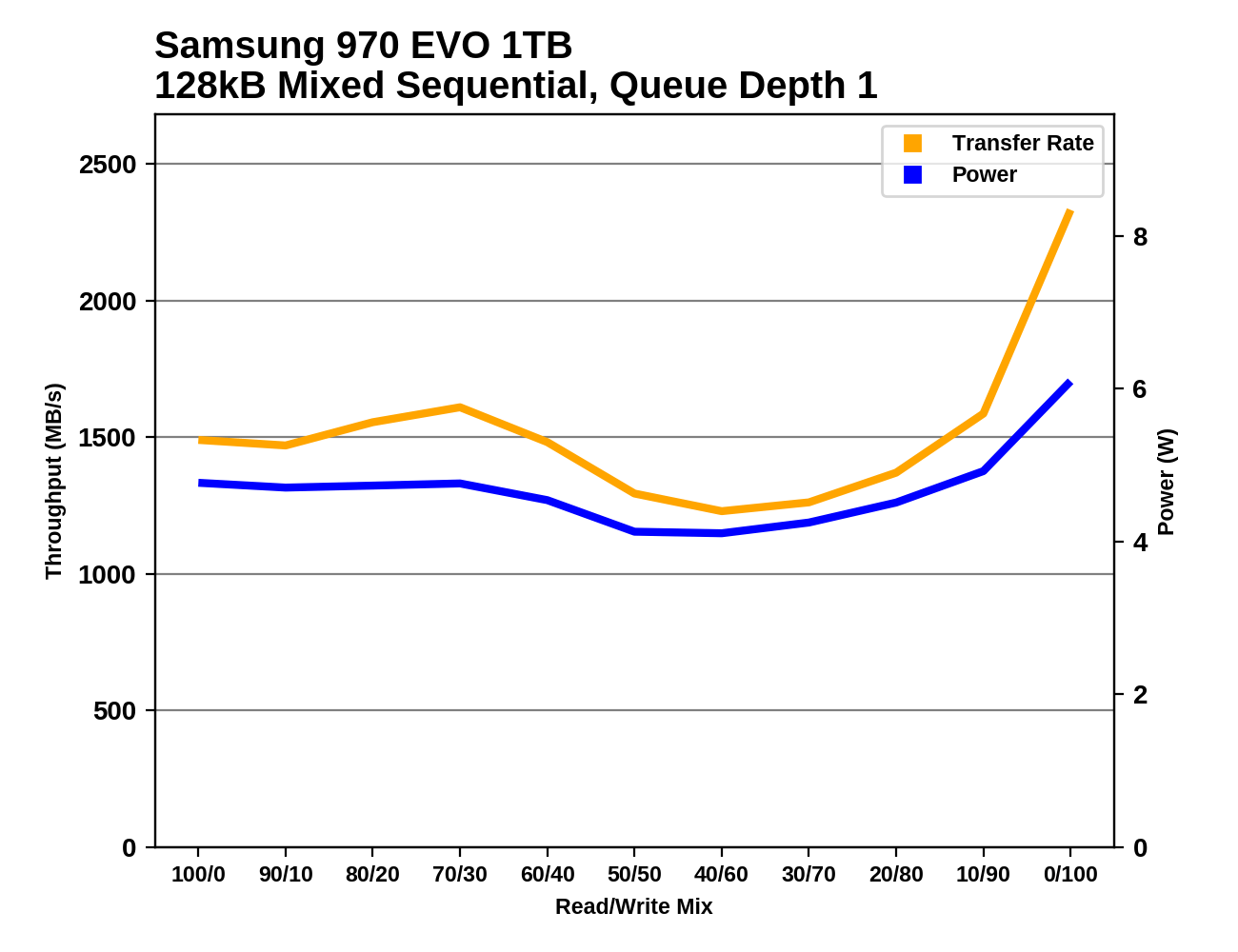 |
|||||||||
The performance of the Samsung 970 EVO on the mixed sequential I/O test wobbles around with an unusual pattern that mirrors that of the PM981 but little else. The 1TB 970 EVO shows the typical spike in performance at the end when the workload shifts to fully cacheable writes, but the test fulls the SLC write cache on the 500GB model and prevents it from getting that boost.










68 Comments
View All Comments
bji - Tuesday, April 24, 2018 - link
You're kind of arguing against benchmarking in general here. Almost no benchmarks are directly relevant to any one person's intended use of the product. Benchmarks are not useful in that they tell me exactly how much performance to expect when running one specific program on one specifically configured hardware setup. They are useful because they allow extrapolation from measured results to expected results on workloads that actually matter to the reader.So I don't agree with your sentiment that Meltdown/Spectre are not worth consideration for their effect on system performance.
However, I am not sure that I would include Meltdown/Spectre considerations in a specific SSD review. I think these considerations deserve to be in a CPU review.
bji - Tuesday, April 24, 2018 - link
Also, may I say that users generally will not notice a 5% slowdown in any particular task; however, we've already established that readers care about minimum differences in benchmark results, because they routinely call a 5% difference clear indication of a "winner" and a "loser" for that benchmark, so for the purposes of performance reviews, the 5% difference contributed by Meltdown/Spectre definitely matters.Flying Aardvark - Tuesday, April 24, 2018 - link
It's up to 50% reduction in storage performance not 5%. You'll feel 50% loss when it happens to you.cmdrdredd - Tuesday, April 24, 2018 - link
What you are saying is misleading. SATA performance is nearly identical (within 2% difference for me). It's NVMe drives that take the hit, but even still they are faster than everything else. Processor speed is unaffected for me as well. Tested multiple times with various benchmarks both ways and it was within margin of error. I don't see the problem to be honest.LurkingSince97 - Wednesday, April 25, 2018 - link
Tell that to my I/O intensive servers that suddenly have 30% less throughput.modeonoff - Tuesday, April 24, 2018 - link
Yes but I am not an average customer. Performance is important for me.Ryun - Tuesday, April 24, 2018 - link
For everyday tasks do you guys notice an improvement in responsiveness of NVMe SSDs versus SATA SSDs?The transfer rates are definitely impressive, I've just never seen a review where I've wanted to upgrade my 500GB SATA SSD for development/gaming/maintenance tasks on my machine. Seems like boot times and opening programs are within a couple seconds of another between NVMe and SATA. Nothing like the jump between HDDs vs SSDs.
HollyDOL - Tuesday, April 24, 2018 - link
I wonder myself, got Vertex 3 (240GB) and while not permanently watching perf counters I don't see much cases of 100% load. Wonder if I would be able to see a difference if I moved to some "best enthusiast m.2/pcie ssd available". (Rest of the machine is fully capable)eek2121 - Tuesday, April 24, 2018 - link
I notice it in certain tasks. My system can get from cold boot to the login screen in about 3 seconds for instance. Editing video is much faster as well.imaheadcase - Tuesday, April 24, 2018 - link
I wouldnt say a huge performance, it really depends on certain tasks that you work with. If you work with file manager a lot with big files sure. But most people no. It makes sense if just upgrading though.